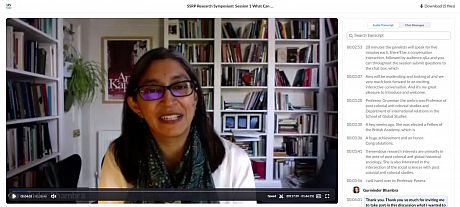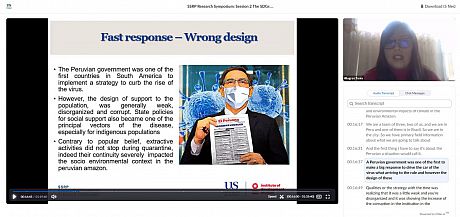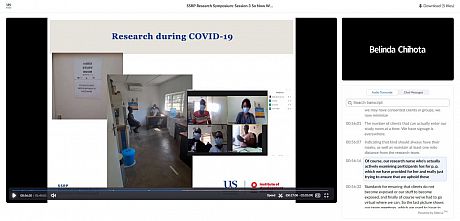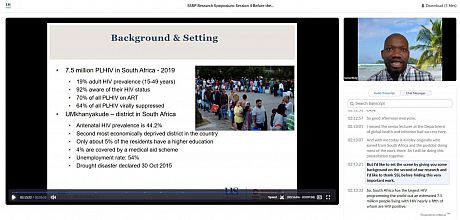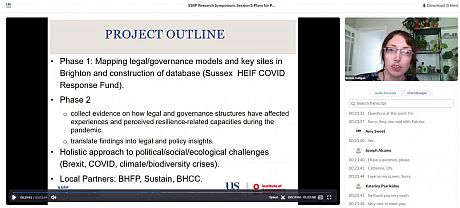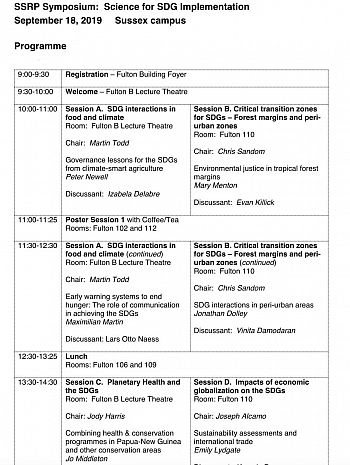SSRP Symposium 2020
Date: 15-16 September 2020
Location: Zoom
As the way we work changed since the last annual Sussex Sustainability Research Programme (SSRP) Symposium, the 2020 event was held online over five sessions across two days. Delegates could attend all sessions, or just the sessions they were able to. The symposium focussed on how research is adapting in the face of the pandemic and global social justice movements, offering delegates an opportunity to reflect on the disruption to their sustainability research and get inspired to get back on track.
Presentations
Session 2 - The two crises The pandemic and global warming - Melissa Lazenby [PDF 775.16KB]
Session 2 - Setbacks and opportunities for the water goal - Mohammad Shamsudduha [PDF 2.73MB]
Session 3 - Impact of Covid-19 on Research Funding - Tina Lehmbeck and Mark Raven [PDF 252.81KB]
Session 3 - Forecasting with fishers out of a job - Max Martin [PDF 1.60MB]
Session 4 - Launch of the SSRP Methods Catalogue - Joshua Moon [PDF 298.35KB]
Session 4: The Global Biodiversity Convention - Anthony Alexander [PDF 409.80KB]
Session 4 - Outdoor air pollution, health and poverty - Wei Shen [PPTX 7.00MB]
Session 5 - Governing urban growing space for community resilience - Bonnie Holligan [PDF 257.43KB]
Recordings
Tuesday 15 September
Session 1: What can sustainability researchers learn from decolonial research?
Session 2: The SDGs take a hit
Session 3: So now what do I do? Tactics, North and South, for coping with disrupted research
Wednesday 16 September
Session 4: Before the deluge: new research findings coming on-line
Session 5: What's next? Plans for pandemic-related sustainability research
Please note: the automatically-generated transciptions with these recordings are yet to be fully proof-read and corrected. If you need assistance with the transcripts, please contact ssrp@sussex.ac.uk
Date: 18th September 2019
Location: Fulton building
In order to cover a range of important topics, the second SSRP Symposium included 2 parallel sessions. Discussions also took place throughout the day across four key areas relating to the SDGs including; interactions in food and climate, critical transition zones, planetary health, and impacts of economic globalisation.
The Symposium also featured 2 consecutive poster sessions where researchers presented the results from all SSRP projects.
The day ended with a keynote speech on the SDGs by the Rt Hon Lord Jack McConnel, Co-Chair of the All-Party Parliamentary Group on the UN Global Goals for Sustainable Development.
Presentations from the Symposium
Andreas Antoniades SSRP Symposium presentation 2019 [PPTX 5.57MB]
Sonya Ayeb -Karlsson SSRP Symposium presentation 2019 [PDF 28.23MB]
Jonathan Dolley SSRP Symposium presentation 2019 [PPTX 30.55MB]
Emily Lydgate SSRP Symposium presentation 2019 [PPTX 1.21MB]
Max Martin SSRP Symposium presentation 2019 [PPTX 8.14MB]
Jo Middleton SSRP Symposium presentation 2019 [PPTX 38.97MB]
Pete Newell SSRP Symposium presentation 2019 [PPTX 3.25MB]

SSRP project posters
Date: 11th September 2018
Location: Fulton Building
The first SSRP Symposium was held on Tuesday 11th September 2018 on the University of Sussex Campus. In attendance were a majority of Principal Investigators on SSRP projects, as well as Co-Investigators, Post-Doctoral Research Assistants, and members of the SSRP Programme Management Group and Secretariat. The Symposium commenced with a welcome from Michael Davies, Pro Vice Chancellor for Research, who highlighted the success of the SSRP in seeding high-quality research projects with the capacity to grow and generate further research income for the University.
In his Introduction, Joseph Alcamo, Director of SSRP, remarked that the Symposium would be an opportunity to collect findings relevant to SSRP’s stakeholders, and for colleagues to influence the future direction of the SSRP. He emphasized that it was urgent now to publish and distribute SSRP research findings as quickly as possible and to communicate these findings to people that needed to hear them from the local to global scale. Following these introductions, two PIs gave plenary presentations of their SSRP projects.
First, Peter Newell presented the project, Climate-resilient agricultural systems in Sub-Saharan Africa, and described the political, economic and socio-cultural policy approaches to climate smart agriculture for increasing productivity and adapting to climate change. Second, Alan Stewart presented Enhancing health in a vulnerable rainforest setting, detailing the project’s aims to systematically map the evidence base for integrated conservation and health services in a Papua New Guinea rainforest community.
The rest of the morning featured “Speed Briefings” (5-minute presentations of project objectives and findings) from 15 SSRP projects.
The afternoon consisted of breakout sessions at which researchers identified key crosscutting findings up to now from SSRP research and articulated follow-up research questions. The sessions were organised according to the following themes:
- Biodiversity and food
- Global health and environment
- Climate change and food insecurity
- Peri-urban environment
- Sustainability perspectives
- Trade, debt and the SDGs
The symposium closed with a discussion about future research and how to foster collaboration within the SSRP research community. Joseph Alcamo reflected on the considerable progress made by SSRP to date, the need to identify and convey policy-relevant findings from its current research, and the opportunity for SSRP to become a world-leading source of knowledge and information for the implementation of the Sustainable Development Goals.
First SSRP Symposium slides [PPTX 74.47MB]
